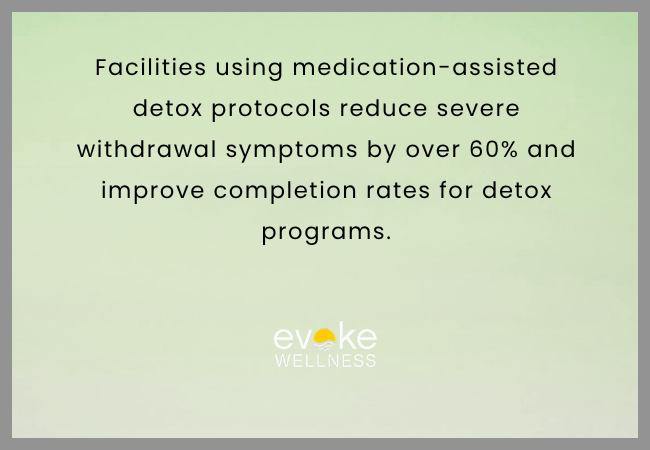Detoxification is the first step in addiction recovery, and it plays a crucial role in helping individuals free themselves from the physical dependency on substances. But how long does detox actually take, and what should you expect during this process? The answer depends on several factors, including the substance being detoxed from, the person’s health, and their history of substance use. While detoxification is the beginning of the recovery journey, understanding the timeline for each substance can help set realistic expectations and prepare for the next stages of treatment.
In this article, we’ll walk through the detox process for different substances, the signs and symptoms to expect, and how detox varies from one substance to another. Additionally, we’ll discuss the importance of medical supervision and why professional detox programs, such as those at an Alcohol Detox Treatment Center in Massachusetts, are essential for a safe and successful recovery.
What Is Detoxification?
Detoxification is the process through which the body eliminates the toxins accumulated from substance use. During this time, the body goes through withdrawal, which can range from mild to severe symptoms depending on the substance used and the individual’s health history. Detox is an essential part of addiction treatment, as it allows individuals to rid their bodies of harmful substances and provides the foundation for long-term recovery.
Detox can be managed in various settings, but it’s always best done under the care of professionals who can monitor symptoms and provide medication to ease withdrawal. Alcohol and Drug Detox Centers in Massachusetts provide the necessary environment for individuals to safely detox with medical support, helping to minimize the risks associated with withdrawal.
The Detox Timeline for Different Substances
The length and severity of detox depend on the type of substance involved. Let’s break down the detox process for some of the most commonly abused substances.
1. Alcohol Detox
Alcohol is one of the most commonly abused substances, and withdrawal from alcohol can be particularly dangerous, especially for those with long-term heavy use. It’s important to note that detox from alcohol should never be done at home because the symptoms can be life-threatening.
Timeline:
-
6–12 hours after the last drink: Mild symptoms such as anxiety, headaches, nausea, and sweating may appear. These symptoms can escalate into more severe withdrawal.
-
24–48 hours: Symptoms intensify and may include tremors, increased heart rate, confusion, and hallucinations. The risk of seizures also increases during this period.
-
48–72 hours: This is when delirium tremens (DTs) may set in. DTs are a serious condition that can cause confusion, agitation, hallucinations, and seizures. This stage requires close monitoring and professional medical intervention, which is why enrolling in an Alcohol Detox Treatment Center in Massachusetts is essential for safety.
-
1–2 weeks: The acute symptoms subside, but individuals may still experience anxiety, depression, and sleep disturbances.
For those looking for a safe detox experience with a structured environment, a Luxury Rehab Center Massachusetts may be ideal for managing withdrawal symptoms while providing comfort and emotional support.
2. Opioid Detox (Heroin, Prescription Painkillers)
Opioid detox can be challenging due to the intense cravings and withdrawal symptoms. While opioid withdrawal is generally not life-threatening, it is extremely uncomfortable, and it often requires medical intervention to make the process more manageable.
Timeline:
-
6–12 hours after the last dose: Symptoms such as muscle pain, restlessness, anxiety, and yawning begin.
-
1–3 days: Withdrawal symptoms peak and include severe muscle aches, vomiting, diarrhea, and insomnia.
-
5–7 days: The physical symptoms start to subside, but psychological symptoms such as depression, anxiety, and cravings can linger.
-
1–2 weeks: While the physical symptoms may disappear, psychological effects can last for weeks or even months.
Medications like methadone or buprenorphine are often used in the detox process to help manage symptoms and reduce cravings. These medications, combined with professional supervision at an Intensive Inpatient Program in Massachusetts, can offer the support needed for long-term recovery.
3. Benzodiazepine Detox
Benzodiazepines, such as Xanax, Valium, and Ativan, are often prescribed for anxiety and insomnia. However, they can be highly addictive, and withdrawal from these substances should never be done without medical supervision. Abruptly stopping benzodiazepine use can lead to severe withdrawal symptoms, including seizures.
Timeline:
-
24–48 hours after last dose: Anxiety, insomnia, and irritability are common. Some individuals may experience physical symptoms such as headaches, muscle pain, or gastrointestinal issues.
-
3–7 days: Symptoms may escalate to include tremors, sweating, confusion, and seizures. These are serious symptoms that require professional care.
-
2–4 weeks: Withdrawal symptoms can persist for weeks or even months, particularly in individuals who have been using benzodiazepines long-term. Psychological symptoms such as depression, anxiety, and cognitive difficulties may also continue.
To ensure safe detoxification from benzodiazepines, individuals should seek help from a Residential Treatment Center in Massachusetts, where they can be medically monitored throughout the entire process.
4. Stimulant Detox (Cocaine, Methamphetamine)
Stimulant withdrawal doesn’t tend to cause the severe physical symptoms seen in alcohol or opioid detox, but it can have significant psychological effects. Stimulants like cocaine and methamphetamine can be highly addictive, and detox from these substances focuses largely on managing emotional and psychological symptoms.
Timeline:
-
24–72 hours: The crash phase begins with symptoms such as fatigue, depression, irritability, and an increased appetite. Individuals may feel like they have no energy and experience deep sadness.
-
1–2 weeks: Psychological symptoms intensify, with cravings, anxiety, and difficulty concentrating. Mood swings are common, and individuals may feel a lack of motivation.
-
2–4 weeks: While most of the physical symptoms subside, cravings and mental health issues like depression or anxiety may persist for an extended period.
For individuals detoxing from stimulants, seeking a Mental Health Treatment Center in Massachusetts that specializes in dual diagnosis (mental health and addiction) may be beneficial, as many people with stimulant addiction also experience co-occurring mental health disorders.
Factors That Influence Detox Duration
Several factors can affect the detox timeline, including:
-
Substance type: As seen above, the timeline varies widely depending on the substance. Alcohol and benzodiazepines, for example, have a much longer and more dangerous withdrawal process compared to opioids or stimulants.
-
Duration and frequency of use: Long-term use or heavy abuse will typically result in a longer detox period.
-
Age and health: Older individuals or those with underlying health conditions may experience a more prolonged detox process.
-
Polysubstance use: Using multiple substances at the same time can complicate detox, leading to longer or more intense withdrawal symptoms.
-
Mental health: Co-occurring mental health conditions, such as depression or anxiety, can also extend detox and withdrawal periods.
Because detox can be a physically and emotionally taxing process, professional care is crucial. Alcohol and Drug Detox Centers in Massachusetts provide medically supervised programs that can help manage withdrawal symptoms safely and effectively.
The Importance of Professional Detox Programs
While some people may attempt detox at home, this is often dangerous and not recommended. Detox can be unpredictable, and the withdrawal process can have severe, even life-threatening, consequences without proper medical supervision. That’s why it’s important to consider detox programs offered by Luxury Rehab Centers in Massachusetts.
Medical professionals in a detox center can provide the necessary interventions to make the process as comfortable and safe as possible. Medication-assisted detox, for example, can ease withdrawal symptoms and reduce the risk of complications. Moreover, detox is often just the first step. After completing detox, individuals need ongoing care to address the psychological, emotional, and behavioral aspects of addiction, which is why inpatient or outpatient treatment is typically recommended.
Why Choose Us?
At our Alcohol Rehab Treatment Center in Massachusetts, we provide a comprehensive detox process that focuses on your safety, comfort, and long-term success. Our team of medical professionals is here to ensure you are supported throughout the detox process, using a combination of clinical expertise and compassionate care.
Our Residential Treatment Center in Massachusetts offers a serene and secure environment, perfect for focusing on recovery. With individualized treatment plans and continuous medical supervision, we ensure that your detox experience is as effective as it is comfortable.
Conclusion
The length of detox varies depending on the substance, individual health, and addiction history. While detox can be uncomfortable, it’s an essential first step on the road to recovery. With the right professional support, individuals can safely and effectively navigate the detox process and move toward lasting sobriety.
At our Alcohol Detox Treatment Center in Massachusetts, we provide the expertise, resources, and compassionate care needed to help you detox safely. If you or a loved one is ready to begin the journey of recovery, we are here to help you every step of the way.
Frequently Asked Questions (FAQs)
How long does detox take for alcohol?
Alcohol detox typically begins within 6–12 hours after the last drink and can last up to 7 days. The intensity of withdrawal symptoms depends on the individual’s drinking history, but symptoms generally peak within 24–72 hours and subside after 3–7 days. Severe withdrawal can lead to life-threatening conditions like delirium tremens, which is why medical supervision is crucial during alcohol detox.
How long does opioid detox take?
Opioid detox can last anywhere from 5 to 10 days, depending on the substance (e.g., heroin, prescription painkillers) and the individual’s usage pattern. Symptoms typically begin within 8–24 hours after the last dose, peaking within 2–3 days. Physical symptoms subside over a week, but psychological cravings may persist longer.
How long does detox take for benzodiazepines?
Benzodiazepine detox varies significantly and can take several weeks, particularly for long-term users. Initial withdrawal symptoms can appear within 1–4 days of discontinuation, with more intense symptoms occurring over the next 1–2 weeks. The detox process may extend to 2–4 weeks or longer for those with a history of heavy use.
How long does stimulant detox take?
Stimulant detox, including from substances like cocaine and methamphetamine, usually lasts 1–2 weeks. The “crash” phase begins within 24–72 hours, with symptoms such as fatigue, depression, and irritability. Long-term psychological effects may persist for weeks or months, requiring continued treatment to manage.
Is detox at home safe?
While detox at home may seem like an option, it’s often unsafe. Detoxing from substances like alcohol or benzodiazepines can cause severe withdrawal symptoms that may be life-threatening. Professional detoxification services at Alcohol and Drug Detox Centers in Massachusetts are necessary for safe and supervised care.





